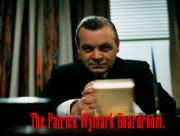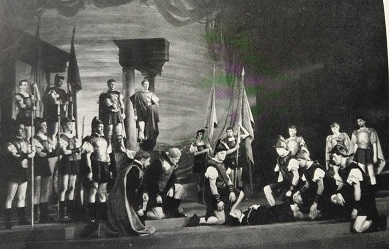
Patrick Wymark at the Old Vic 1952 - 1953 - Romeo and Juliet, The Merchant of Venice, Julius Caesar
"Hence! Home you idle creatures. Get you home. Is this a holiday?." Flavius - Julius Caesar.
Following Patrick Wymark's training at the Old Vic Theatre school and stage debut in Othello ( See here) his roles in the Old Vic productions increased.

Patrick Wymark as Trebonius in this photo by Desmond Tripp. William Devlin plays Brutus and Robin Bailey plays Mark Anthony
Patrick Wymark joined the Old Vic at a time of intense turmoil. As director Hugh Hunt noted, "the departure of Sir Laurence Olivier, Sir Ralph Richardson and John Burrell from the directorship of the company had been universally regretted."* Although, the Old Vic company was expected to become part of the National Theatre ( which the Queen Mother had laid the foundation stone for on 13 July 1951), three of the four existing directors, Michel Saint-Denis, Glen Byam Shaw and George Devine had resigned in a dispute with the Governors over, "a trend towards commercialism." The remaining director, Hugh Hunt, was appointed Administrative Director, and playwright Tyrone Guthrie was recruited as Managing Director. The Governors announced that not only would the Old Vic School be closed they would also disband the Young Vic company (which performed Shakespeare to schoolchildren). Guthrie's strategy was to create two Old Vic companies of equal status, each of which would alternate London performances with tours of the provinces. "It's a mistake to look upon audiences outside of London as inferior," Guthrie told The Stage in September 1951. "There will be no playing down or thinking that anything will do for the provinces."
*Hugh Hunt, Old Vic Prefaces, Routledge and Keegan Paul, 1954
Guthrie brought the former actor-manager Sir Donald Wolfit (Blood of the Vampire) to the Old Vic to star in the season. But Wolfit's time with the Old Vic was tempestuous and his sudden departure led to a controversial production of King Lear starring Stephen Murray, later replaced by The Plane Maker's William Devlin. See The Lear Affair.
On 15 April 1952, Patrick Wymark appeared as the Sergeant in The Other Heart. An original play about Francois Villon by James Forsyth, it starred Alan Badel as Villon, Irene Worth as Catherine De Vausselles, Paul Rogers as Villon's uncle and Douglas Wilmer as Rene De Montigny (according to Wilmer, "a poor man's version of Shakespeare's Mercutio). The play was poorly received by the critics .

South Africa...and the origin of the Wymark scar
On 22 May 1952, Patrick Wymark sailed with other members of the Old Vic company on the SS Pretoria bound for South Africa. Including Jane Wenham and Robert Shaw, the 40-strong company was due to spend three months touring South Africa and Rhodesia. Douglas Wilmer, in his memoir Stage Whispers, recalls that Tyrone Guthrie was billed to give a series of lectures across the continent, "eagerly awaited, much like the Second Coming," but at the last minute he sent the South African authorities a telegram saying, "Sorry, can't come. Guthrie." In view of the extensive preparations and pre-publicity, Wilmer notes that, "eccentricity can sometimes have its less attractive moments."
Wilmer recalls that under the Apartheid regime, the Old Vic company was only allowed to play to White Audiences. "So we arranged to play on Sundays, taking the entire productions, minus scenery, to the township slums of Johannesburg, where we received a most enthusiastic reception."
The South African tour would have a lasting, and almost fatal impact on Patrick Wymark. While in Salisbury, Rhodesia (Zimbabwe) , "I was driving along a main street when a car shot out from an intersection and ran into me. When I regained consciousness I was in hospital. I had gone head first through the wind-screen and my lower lip was almost torn off. They put 25 stiches into the main wound, but for days I couldn't speak."
The doctors and the Old Vic director feared that Wymark's career as an actor may be over. But "I asked the doctors if I could do any special exercises to help me regain full control over my voice...Nobody knew any special method, so I decided to simply go ahead and keep my lips moving as much as possible. It hurt like hell. But I just went on, reciting anything from Shakespeare to Toad of Toad Hall. Within three weeks I was back with the company."
There was no coverage of Wymark's accident in the press when the sun-tanned actors returned to England on the boat train. In a later magazine interview, Olwen Wymark noted that "Patrick was wearing a beard."
Monday September 15th 1952 saw the London premiere at the Old Vic of Romeo and Juliet starring Claire Bloom, Alan Badel and Peter Finch as Mercutio. Patrick Wymark appeared as Old Capulet, and in the small but pivotal role of Friar John, who (spoiler) fails to deliver the message telling Romeo that Juliet is not really dead. William Squire appeared as Benvolio, and Alan Dobie was the page to Paris, while students James Maxwell, Eric Thompson, Mike Morgan, Douglas Rain and Phyllida Law were among the citizens.
Under the direction of Hugh Hunt, the production arrived from the Edinburgh Festival with what critics felt was an exciting and rowdy production. Street brawls were choreographed by Laurence Payne, who also played a sinister and explosive Tybalt. William Devlin (Sir Gerald Merle) as Chorus, delivered an eloquent prologue, and Athene Saylor entertained as Juliet's Nurse. Despite complaints from some critics that most of the actors could not capture the rhythms of their speeches, the production was a success, with the Queen and Duke of Edinburgh attending unannouncedin the front row of the Dress Circle on the night of 11 November. The production took a break from 18 November to 20 December 1952, to make room for the Christmas production of The Italian Straw Hat starring Paul Rogers, Laurence Payne and William Squire, before Romeo and Juliet returned from December 22nd.
Alan Badel as Romeo and Claire Bloom as Juliet in the Old Vic production.
The Merchant of Venice ran from January 6th to February 21st 1953. Patrick Wymark appeared as Salerio, a friend to the Merchant, Antonio (Douglas Campbell). Together with Tony Van Bridge ( The Quatermass Experiment) as Salanio, Wymark caught the attention of J.C.Trewin in The Sketch, who noted that the pair, "are for once heavy elderly types, not in the least like the magnificent young men of high-flowing speech imagined by Harley Granville Barker."
The production was set in a fairy-tale land - described as a Canaletto Venice with 18th Century costumes.Roger Furse's design showed, " a vista of St Marks and a Rialto bridge...hidden when Belmont in the form of a white temple, rises like a cinema organ," according to The Truth, which also praised Kenneth Connor, as the servant Launcelot Gobbo for "the techniques, tricks and resources of a first class comedian.". As the Pavilion of Belmont sinks back through the floor at the end of the scene, Connor did a double take and then tested the stage with his foot before walking forward.
Robert Urquhart (Henry Forbes in The Plane Makers) played Bassanio, the adventurous friend of Antonio. Some critics thought the Ullapool-born, former sailor, ex-Glasgow Citizens Theatre player had a "curiously rough edge to his voice" as the humourous gallant. Perhaps a bit of prejudice in a play about prejudice? William Squire, (later Hunter in Callan) as Gratiano, took a hit for Hugh Hunt's realistic approach to the dialogue, "running one line into another with the deliberate intention of destroying rhythm and murdering metre."
Much of the praise was directed towards Irene Worth as Portia. The Tatler noted that, "Irene Worth has a flashing pair of white breeches that would have rivalled the wit of any coffee house table. (She) delivers the 'Quality of Mercy' speech with conviction."
Irene Worth as Portia
As Shylock, Paul Rogers was, stern, earnest and vindictive," in the view of The Tatler. Adopting a wig and make-up that today calls to mind Peter Wyngarde as Jason King, Rogers played Shylock subtley. Rather than adopt an accent, he had listened to recordings of Hebrew phrases to, introduce colour to the verse without being too definite.". In the opinion of The Stage, Rogers, "dominates the play. He never steps for a moment from the skin of the part." The reviewer for The Sketch noted that, "Shylock draws our sympathy when he totters from the stage after Portia's forensic victory, "earning, The Stage added, "a spontaneous ovation...there is something repugnant to modern tastes in the baiting of Shylock during the trial scene," and Rogers earned the involuntary sympathy usually reserved for Malvolio. Rogers later told the paper that, "He's got to be a villain. It's no good underplaying him and it's no good playing for sympathy. Any sympathy you may get will arise, incidentally, out of the wonderful lines Shakespeare has put in his mouth."
Paul Rogers (Shylock) and Robert Urquhart (Bassanio) in The Looking Glass War (1970) with Vivien Pickles.
Julius Caesar ran from February 24th 1953 to 30 March. Patrick Wymark played three roles in this production: the tribune Flavius who opens the play, Trebonius one of the conspirators, and Clitus one of the soldiers who Brutus tries to coerce into killing him at the end of the play.
Julius Caesar was regarded as a production of great sincerity, though some critics were perplexed by the mixture of Tudor doublets and Roman togas worn by the cast. William Devlin, as Brutus, sported an Elizabethan beard. Paul Rogers was once again praised in the role of Cassius, speaking his lines with meaning as well as appreciation of the verse." and the quarrel and reconciliation of Cassius and Brutus was thought to be a highlight. However, opinion was divided over Douglas Campbell as Caesar and especially Robin Bailey as Anthony. The Worthing Herald, which had followed Bailey in his work at the town's Connaught Theatre, observed that The Times had praised bailey's "arresting figure (and) powerful voice", while The Telegraph had criticised his matter of factness of speech. The Mail, meanwhile, had praised, "Boin Bailey's super-charged Mark Anthony."
Murder in the Cathedral ran from 31st March to May 2nd 1953. Patrick Wymark was cast as the Third Priest in this production which starred an ailing Robert Donat as Beckett. The production, directed by Robert Helpmann, was recorded for sound and is still available as a CD today.
Henry VIII began an eight week run on May 6 1953. Directed by Tyrone Guthrie, it starred Paul Rogers as Henry, Jenette Sterke as Anne Bullen and Alexander Knox as Wolsey. Patrick Wymark played Charles, Duke of Suffolk, one of the King's circle of friends. This was Wymark's longest sustained part in this cycle of plays. The opening performance - to mark the Coronation - was attended by the Queen and Duke of Edinburgh. This was believed to be the first time in 200 years that a reigning monarch had attended a first night.